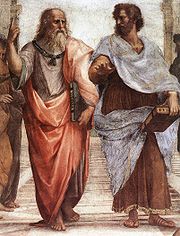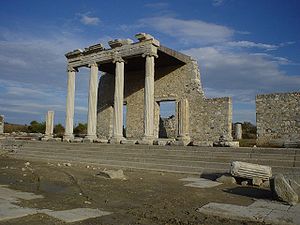
Chrematistics
Encyclopedia
Chrematistics according to Thales of Miletus
is the art of getting rich.
 Aristotle
Aristotle
established the fundamental difference between economics and chrematistics. The accumulation
of money itself is an unnatural activity that dehumanizes those who practice it. Like Plato
, he condemns the accumulation of wealth. Trade exchanges money for goods and usury
creates money from money. The merchant does not produce anything: both are reprehensible from the standpoint of philosophical ethics.
 According to Aristotle, the "necessary" chrematistic economy is licit if the sale of goods is made directly between the producer and buyer at the right price; it does not generate a value-added product. By contrast, it is illicit if the producer purchases for resale to consumers for a higher price, generating added value. The money must be only a medium of exchange and measure of value
According to Aristotle, the "necessary" chrematistic economy is licit if the sale of goods is made directly between the producer and buyer at the right price; it does not generate a value-added product. By contrast, it is illicit if the producer purchases for resale to consumers for a higher price, generating added value. The money must be only a medium of exchange and measure of value
.
The Catholic Church maintained this economic doctrine throughout the Middle Ages (Second Council of the Lateran
,1139). Saint Thomas Aquinas
accepted that capital accumulation if it served for virtuous purposes as charity.
Although Martin Luther
raged against usury and extortion
, according to Max Weber
's study of capitalism and the Protestant ethic, frugality, sobriety, deferred consumption and saving were among the key values of the rising bourgeoisie in the age of the Reformation.
Karl Marx
took up the concept in his famous work Das Kapital.
Thales
Thales of Miletus was a pre-Socratic Greek philosopher from Miletus in Asia Minor, and one of the Seven Sages of Greece. Many, most notably Aristotle, regard him as the first philosopher in the Greek tradition...
is the art of getting rich.

Aristotle
Aristotle was a Greek philosopher and polymath, a student of Plato and teacher of Alexander the Great. His writings cover many subjects, including physics, metaphysics, poetry, theater, music, logic, rhetoric, linguistics, politics, government, ethics, biology, and zoology...
established the fundamental difference between economics and chrematistics. The accumulation
Capital accumulation
The accumulation of capital refers to the gathering or amassing of objects of value; the increase in wealth through concentration; or the creation of wealth. Capital is money or a financial asset invested for the purpose of making more money...
of money itself is an unnatural activity that dehumanizes those who practice it. Like Plato
Plato
Plato , was a Classical Greek philosopher, mathematician, student of Socrates, writer of philosophical dialogues, and founder of the Academy in Athens, the first institution of higher learning in the Western world. Along with his mentor, Socrates, and his student, Aristotle, Plato helped to lay the...
, he condemns the accumulation of wealth. Trade exchanges money for goods and usury
Usury
Usury Originally, when the charging of interest was still banned by Christian churches, usury simply meant the charging of interest at any rate . In countries where the charging of interest became acceptable, the term came to be used for interest above the rate allowed by law...
creates money from money. The merchant does not produce anything: both are reprehensible from the standpoint of philosophical ethics.

Labor theory of value
The labor theories of value are heterodox economic theories of value which argue that the value of a commodity is related to the labor needed to produce or obtain that commodity. The concept is most often associated with Marxian economics...
.
The Catholic Church maintained this economic doctrine throughout the Middle Ages (Second Council of the Lateran
Second Council of the Lateran
The Second Council of the Lateran is believed to have been the Tenth Ecumenical Council by Roman Catholics. It was held by Pope Innocent II in April 1139, and was attended by close to a thousand clerics...
,1139). Saint Thomas Aquinas
Thomas Aquinas
Thomas Aquinas, O.P. , also Thomas of Aquin or Aquino, was an Italian Dominican priest of the Catholic Church, and an immensely influential philosopher and theologian in the tradition of scholasticism, known as Doctor Angelicus, Doctor Communis, or Doctor Universalis...
accepted that capital accumulation if it served for virtuous purposes as charity.
Although Martin Luther
Martin Luther
Martin Luther was a German priest, professor of theology and iconic figure of the Protestant Reformation. He strongly disputed the claim that freedom from God's punishment for sin could be purchased with money. He confronted indulgence salesman Johann Tetzel with his Ninety-Five Theses in 1517...
raged against usury and extortion
Extortion
Extortion is a criminal offence which occurs when a person unlawfully obtains either money, property or services from a person, entity, or institution, through coercion. Refraining from doing harm is sometimes euphemistically called protection. Extortion is commonly practiced by organized crime...
, according to Max Weber
Max Weber
Karl Emil Maximilian "Max" Weber was a German sociologist and political economist who profoundly influenced social theory, social research, and the discipline of sociology itself...
's study of capitalism and the Protestant ethic, frugality, sobriety, deferred consumption and saving were among the key values of the rising bourgeoisie in the age of the Reformation.
Karl Marx
Karl Marx
Karl Heinrich Marx was a German philosopher, economist, sociologist, historian, journalist, and revolutionary socialist. His ideas played a significant role in the development of social science and the socialist political movement...
took up the concept in his famous work Das Kapital.
Further reading
- AKTOUF, O. (1989): “Corporate Culture, the Catholic Ethic, and the Spirit of Capitalism: A Quebec Experience”, in Journal of Standing Conference on Organizational Symbolism. Istambul, pp. 43–80.
- BROADIE, S.; ROWE, C. (2002): Aristotle Nicomachean Ethics: Translation, Introduction, and Commentary. Oxford: Oxford University Press.
- KRAUT, R. (ed.) (2006): The Blackwell Guide to Aristotle’s Nicomachean Ethics. Oxford: Blackwell.
- McLELLAN, D. (ed.) (2008): Capital (Karl Marx): An Abridged Edition. Oxford: Oxford Paperbacks; Abridged edition.
- PAKALUK, M. (2005): Aristotle’s Nicomachean Ethics: An Introduction. Chicago: University of Chicago Press.
- SCHEFOLD, B. (2002): “Reflections on the Past and Current State of the History of Economic Thought in Germany”, in History of Political Economy 34, Annual Supplement, pp. 125-136.
- SHIPSIDE, S. (2009): Karl Marx's Das Kapital: A Modern-day Interpretation of a True Classic. Oxford: Infinite Ideas.
- TANNER, S.J. (2001): The Councils of the Church. A Short History. New York: The Crossroad Publishing Company.
- DALY, H. and COBB, J. (1984): 'For the Common Good: Redirecting the Economy toward Community, the Environment, and a Sustainable Future'. Boston: Beacon Press.
- WARNE, C. (2007): Aristotle's Nicomachean Ethics: Reader's Guide. London: Continuum.

